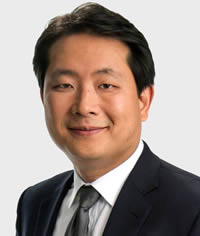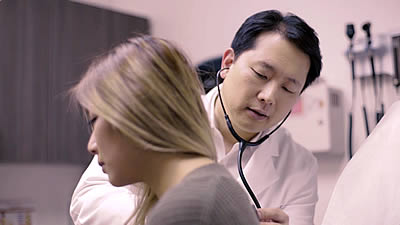

Offering Urgent Care
Einstein Alum Develops a Thriving Urgent-Care Network
Dr. Richard Park (M.D. Class of 1999) learned early how to roll with life’s ups and downs. When he was growing up in Flushing, NY, his parents owned a series of businesses, including a restaurant and a manufacturing concern. “It’s a Korean thing,” he said with a hint of wry humor. “We open stores, we close stores.”

Richard Park, M.D., class of 1999As a teenager, he attended Stuyvesant, in lower Manhattan, New York City’s public high school for students gifted in math and sciences. To help with the family’s finances, he took a job in a one-hour photo shop.
After high school, he was accepted to the University of Pennsylvania’s Wharton School of Business. To pay for college he opened his own one-hour photo store at 77th Street and Lexington Avenue, in Manhattan, across from Lenox Hill Hospital.
All through college, Richard commuted between New York and Philadelphia, working every weekend in the photo shop. “Late one night, during my sophomore year,” he recalled, “I was watching a TV show on Guatemalan street urchins and I thought, ‘Wow. I want to be a pediatrician and go on medical missions to Guatemala.’”
One Tough Customer
As fate would have it, Dr. Bertrand Bell lived in the building where Dr. Park’s photo shop was located, and became a regular customer. Dr. Bell was then a professor of medicine at Einstein and director of ambulatory care at Jacobi Medical Center, and is now a distinguished university professor emeritus.
“Over time, we started talking and Dr. Bell invited me to visit him at Jacobi,” said Dr. Park. “It was exciting to watch him work. After I graduated from Wharton he encouraged me to apply to Einstein.”
Finding His Calling
Throughout his medical school years, Dr. Park lived at home, commuting from Queens to the Bronx, and he continued working at his photo store.
“Medical school was challenging at first because I also had to work,” he said. “But Einstein was a nurturing environment.” Inspired by his role models at Jacobi—Drs. Angelo Baccelieri, Steven Nazario and Charles Martinez—he decided to specialize in emergency medicine.
“I watched how they worked in the clinic and the ER. They loved their patients and spent lots of time with them. They also knew how to address everything from shoulder pain to broken bones and other ailments. I saw the breadth of what it meant to be an emergency physician.”
After graduating from Einstein, Dr. Park completed his residency in emergency medicine at Long Island Jewish Medical Center and stayed on as an attending for six years.
Serving Kindness

Dr. Park at workDrawing on his training and expertise, in 2010, Dr. Park opened CityMD, a walk-in clinic on East 86th Street. He gave it a dual mission: to deliver immediate, efficient healthcare to people of all ages and incomes, and to serve people with kindness.
Today, CityMD has 52 urgent-care sites throughout the New York metropolitan area, with 15 new clinics planned for this year. And, starting in July, CityMD will expand to the West Coast, with six sites in Seattle.
“We treat any medical problem that’s not life-threatening,” Dr. Park explained. In caring for a patient with a cut or bruise, he noted, the physician may identify an underlying problem such as hypertension, prediabetes or depression. In such cases, the patient is referred for follow-up care at one of the hospital systems or medical practices linked to CityMD through its call center on Long Island.
He and his team of 1,500 employees—including 200 full-time and 50 part-time physicians, board certified in emergency medicine—saw 1 million patients in 2015; 1.3 million patients are projected for 2016.
“It’s all about connecting,” he said. “If we work together, we can make healthcare better and more efficient for people. At CityMD we reach out and collaborate with other organizations, hospital systems, medical practices, insurance companies, employers, providers and government.”
Reinforcing the Mission
Dr. Park enjoys seeing patients and relishes his role as CEO. “CityMD gives me a forum where I can both practice and preach our mission,” he said, adding, “My job is to evangelize, to make sure that everyone—from the physician to the person at the front desk—understands that we’re about serving kindness. That’s how we help society and inspire our patients’ trust. It’s the most important thing. It’s why we exist.”
A major challenge in running such an enterprise, he noted, is “sticking to your convictions. You worry, ‘Can I afford to deliver kindness and compassion?’ These are not things that add to your bottom line.”
Sage Advice for Einstein Students
Reflecting on his unusual career path, Dr. Park refers to the TV show he saw about Guatemalan street children as “the seed that started it all,” and he credits Einstein with providing the conditions for that seed to grow and flourish.
“I haven’t made it to Guatemala yet, but we’re doing medical mission-type work right here,” Dr. Park said. “Many of our patients are not so well off.”
His advice for current Einstein students with dreams of becoming entrepreneurs: “Be trustworthy and conduct yourself with integrity, every step of the way. That’s how you build relationships.”
He added, “We are stewards for a short time. What’s most important is how we treat one another, not who ends up with the most toys.”
Editor’s Note: All photos courtesy of CityMD
Posted on: Friday, June 3, 2016


